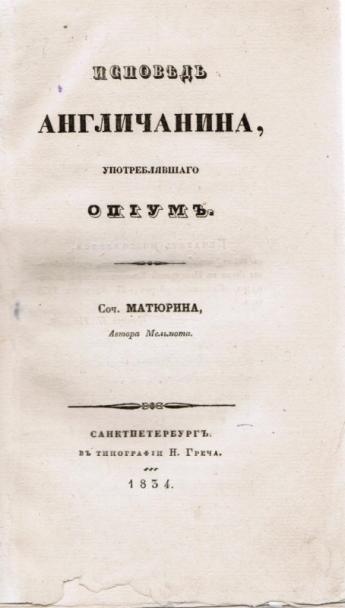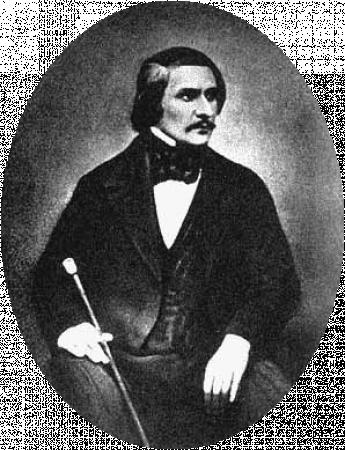Antiquarian Booksellers' Association Simon Beattie Ltd
Collecting Rare Books and First Editions - Under the influence

By Simon Beattie
This is the first edition in Russian of Thomas De Quincey’s famous Confessions of an English Opium Eater (1822), a very rare book. The title reads: The confession of an Englishman who has taken opium. A work by Maturin, the author of Melmoth. The attribution is to the Irishman Charles Maturin, whose Melmoth the Wanderer (1820) had been published in Russian (via a French translation) in 1833.
Critics have shown that De Quincey’s book had a direct influence on the great Russian writer, Nikolai Gogol, author of The Government Inspector (1836), Dead Souls (1842), etc. ‘Though writing at a time when Russian literature was still under the strong influence of western European letters, Gogol was himself scarcely touched by this influence … But in one instance, at least, we have what looks like a case of the direct influence of an English work on Gogol, and the use he made of this source presents an interesting problem in literary borrowing. This is the influence of De Quincey’s Confessions of an English Opium-Eater on Gogol’s well-known tale, The Nevsky Prospect.
‘The Opium-Eater was first translated into Russian in 1834, and the authorship was then very strangely attributed to Maturin … De Quincey had scarcely been heard of in Russia by this time, and it is quite certain that the Russian version of his masterpiece was based on a French translation with the initials of Alfred de Musset attached to it (L’anglais mangeur d’opium … Paris, 1828) … [and] indeed, a Russian critic of 1834 … felt that at last the secret of Maturin’s fantastic imagination was revealed …
‘The treatment of London in the Opium-Eater … seems to have directly influenced [Gogol]. The great metropolis, with its mists and age-old wonders, its pleasures and sorrows, looms up as the background for all De Quincey’s shadowy narration … For him London is at once the gateway to sublime pleasure and terrifying despair. In a similar fashion Gogol portrays St Petersburg. His treatment of the Russian capital in this respect was quite unique …’
(E. J. Simmons, ‘Gogol and English literature’, MLR, vol. 26, no. 4 (Oct. 1931), pp. 445, 446, 447f).
(Posted on Simon Beattie's blog "The Books You Never Knew You Wanted", presented here by permission of the author.)
Are you interested in the works of Thomas de Quincey?

